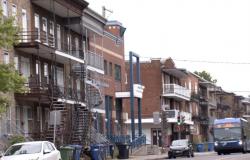MONTREAL — The heat does not have the same repercussions depending on the city where you are. Extreme heat events have more considerable impacts in Montreal and Toronto, according to a Statistics Canada analysis published Wednesday. The greater proportion of housing in these cities could partly explain this.
The study analyzed the effects of intense heat episodes on mortality whose causes are of non-accidental, cardiovascular and respiratory origin. Twelve Canadian cities were analyzed from 2000 to 2020. These are Toronto, Montreal, Calgary, Ottawa, Edmonton, Winnipeg, Mississauga, Vancouver, Brampton, Hamilton, Surrey and Quebec.
During this period, there were approximately 668 excess non-accidental deaths in these cities attributable to increased risks of death during heat waves, 115 excess deaths caused by cardiovascular causes and 114 excess deaths of respiratory origin.
The results show that extreme heat is associated with a number of excess deaths “considerably greater than zero” whose causes are of cardiovascular origin in Montreal and of respiratory origin in Montreal, Quebec and Toronto.
Montreal seems to have the most negative impacts compared to other large Canadian cities. It is the only city in which extreme heat events were associated “with an unambiguous increase” in excess mortality for all three outcomes (non-accidental, cardiovascular and respiratory).
The Statistics Canada report presents certain avenues to explain the heterogeneity between cities. It is argued that the concentration of rental housing could play a role, among other things because levels of access to air conditioning are lower among tenants compared to owners.
“Exploratory analyzes indicate that overall extreme heat risks relative to all three mortality outcomes correlate directly with the proportion of households that rent,” the study states.
Among the 12 cities, Montreal and Toronto had two of the three highest proportions of renting households, 61% and 48% respectively. It is noted that according to other research from Statistics Canada from 2023, people living in rental housing are much less likely to have air conditioning compared to provincial averages.
In Quebec, 49% of tenants have an air conditioner compared to an average of 58%, in Ontario this rises to 71% compared to 85% and in British Columbia 24% of tenant households have air conditioning. compared to a provincial average of 32%.
Another hypothesis mentioned to explain the disparity in results between cities is the history of weather conditions and adaptation to extreme heat. According to previous research, people living in areas with lower ambient temperatures and less frequent extreme heat events may acclimatize less well to heat. Additionally, these regions often have insufficient adaptation measures to cope with extreme heat.
The study also highlights that the impact of extreme heat on mortality was generally greater among people aged 65 and over.
Exposure to extreme heat is associated with mortality in several ways. This can cause body heat to increase and thus exceed the thermoregulatory capabilities of the human body and leading to “heat exhaustion, heat-related illness and heat stroke.” The report explains that heatstroke is “a serious heat-related illness” that requires rapid cooling of body temperature or can lead to death.
Exposure to high temperatures also exacerbates existing health problems, such as cardiovascular and respiratory diseases.
On the other hand, heat is “conducive to the formation of air pollutants,” such as ozone, which are associated with the risk of premature death when exposed to them in the short term and long term.
—
The Canadian Press’ health content receives funding through a partnership with the Canadian Medical Association. The Canadian Press is solely responsible for editorial choices.






